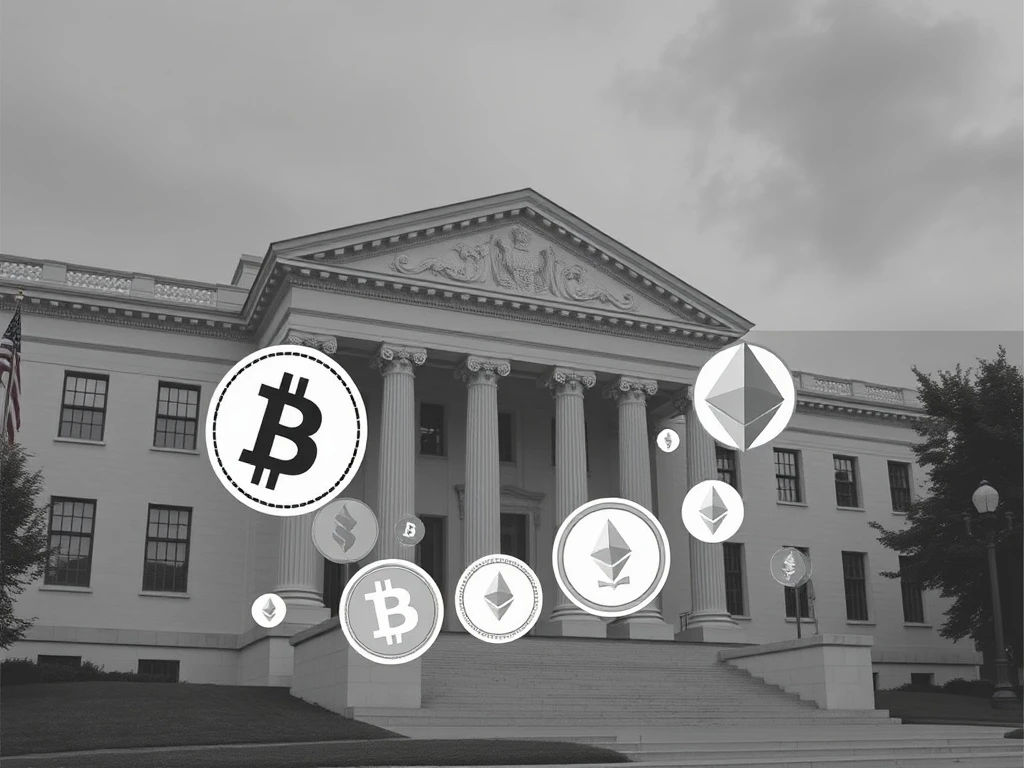SEC Approves Grayscale ETF: A Landmark Moment for Digital Large-Cap Crypto Fund Conversion

Big news just dropped for crypto investors! The US Securities and Exchange Commission (SEC) has given the green light for Grayscale to convert its Digital Large-Cap Fund into an exchange-traded fund (ETF). This move is a significant development, following Grayscale’s previous success in converting its Bitcoin trust. It signals a maturing market and offers investors a new way to access a basket of major digital assets through a familiar investment vehicle. The **SEC approves Grayscale ETF** conversion, opening up new possibilities.
Understanding the Grayscale Digital Large-Cap Fund
Before its conversion, the **Grayscale Digital Large-Cap Fund** (GDLC) operated as a trust, providing investors exposure to a selection of leading cryptocurrencies without the complexities of direct ownership. The fund tracks an index composed of the top digital assets by market capitalization. Its composition at the time of approval was heavily weighted towards Bitcoin and Ethereum, but also included other significant altcoins:
- Bitcoin (BTC): Roughly 80.2%
- Ether (ETH): 11.3%
- XRP (XRP): Over 4.8%
- Solana (SOL): Approximately 2.7%
- Cardano’s ADA (ADA): 0.81%
This structure allowed investors to gain exposure, but the trust format had limitations compared to an ETF.
Why the Shift to Crypto ETF Conversion?
Grayscale’s strategy has increasingly focused on **Crypto ETF conversion** for its various trusts. A key reason for this shift relates to arbitrage opportunities that existed with the trust structure. Unlike ETFs, Grayscale’s trusts typically had lock-up periods and lacked the mechanism for in-kind redemptions (exchanging fund shares directly for the underlying assets).
This structure often led to the trusts trading at significant premiums or discounts to their Net Asset Value (NAV). Savvy investors exploited these spreads for profit through arbitrage. By converting to an ETF, Grayscale enables creation and redemption mechanisms that help the fund’s market price stay closely aligned with the value of its underlying assets, effectively narrowing these arbitrage windows.
The SEC Approves Grayscale ETF: What It Means
The official approval from the SEC allows Grayscale to operate the Digital Large-Cap Fund as an ETF. This is a crucial step for both Grayscale and the broader crypto market. The conversion means the fund will now function more like traditional ETFs available on stock exchanges, offering greater liquidity and accessibility to a wider range of investors, including those in traditional finance who may be more comfortable with the ETF wrapper.
The fund’s investment objective, as stated in Grayscale’s letter, remains focused on reflecting the value of the underlying digital assets, less expenses. The **SEC approves Grayscale ETF** conversion, validating this approach for a multi-asset crypto fund.
Grayscale’s Legal Victory Paved the Way for Grayscale ETF Approval
This latest **Grayscale ETF approval** didn’t happen in a vacuum. It follows Grayscale’s successful legal challenge against the SEC regarding the conversion of its Bitcoin Trust (GBTC). In 2022, the SEC denied Grayscale’s application to convert GBTC into an ETF. Grayscale sued, arguing the denial was inconsistent with the SEC’s approval of Bitcoin futures ETFs.
In August 2023, a US court sided with Grayscale, ruling the SEC’s denial was ‘arbitrary and capricious’. This legal victory put significant pressure on the SEC and is widely seen as having paved the way for the eventual approval of spot Bitcoin ETFs, including the conversion of GBTC, and now, the Digital Large-Cap Fund.
Implications for the Large-Cap Crypto Fund Landscape
The conversion of Grayscale’s **Large-Cap Crypto Fund** into an ETF is more than just a structural change for one product. It signifies the increasing acceptance and integration of digital assets into traditional financial systems. It provides investors with a regulated and accessible way to invest in a diversified basket of major cryptocurrencies, rather than just Bitcoin or Ethereum individually.
While GBTC, now an ETF, remains the most expensive Bitcoin ETF on the market in terms of expense ratio, the terms for the Digital Large-Cap ETF will be closely watched. This conversion represents the end of an era for the trust structure and highlights the ongoing maturation of the crypto investment landscape.
Conclusion
The SEC’s approval for the **Grayscale Digital Large-Cap Fund** to convert into an ETF is a landmark development. It enhances accessibility, liquidity, and price efficiency for investors seeking exposure to a diversified portfolio of major cryptocurrencies. Following Grayscale’s hard-fought legal battle for its Bitcoin product, this latest conversion underscores the increasing normalization of crypto investment vehicles within traditional finance and marks another step forward for the industry.









